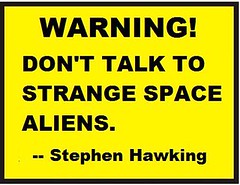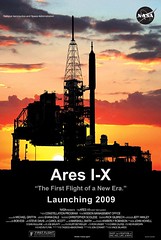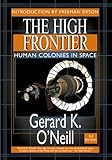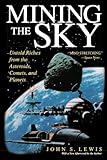Understanding Alien Contact as a Sci-Fi Writer
Alien contact has long been a staple of science fiction writing and I thought it might be a good idea to chat a bit about it with the readers of this blog. Despite the fact that there are many, many movies, books, cartoons, comics and recordings about alien contact almost as soon as you start to discuss the subject seriously people start to get nervous and the easiest way to dismiss their fears is to switch off and call you a “nut” or something equally charming.

Photo by Mike Licht, NotionsCapital.comFor a professional scientist to discuss the subject at all is usually a way to signal that you want your career to end. For this reason I want to make clear that despite my disagreeing with Stephen Hawking about his recent pronouncements on alien life and our best ways of surviving alien contact, I admire his courage as a professional scientist in commenting on the subject at all.
The whole topic of aliens and alien species is seldom discussed seriously. There is no reason to suspect that they will be “Greys” or otherwise. People prefer to discuss the X-files, or their latest government conspiracy theory – “Yes, of course I believe in aliens, but we can’t discuss it as it is above top secret and the government will find out if we do…”
What? Are you serious?
Until very recently we had a government in the UK that couldn’t hold onto secret documents already inside intelligence agencies, let alone act with enough efficiency to stop us noticing or talking about something as big as alien contact.
Maybe the new government will be more efficient, but the jury is still out on that one! 🙂
Space Travel Requires Advanced Technology
To be serious for a second here, Arthur C Clarke once said that “Any sufficiently advanced technology is indistinguishable from magic.”
Let us take this a bit further. As we are currently still developing the ability to launch a successful mission to Mars, how much more advanced would that technology be if it allowed interstellar flight and not just limited space flight in the solar system?
To assist in thinking about this, the distance from Earth to Mars is between 55 million kilometres and 400 million kilometres or so. For aliens to arrive on Earth they would most likely need to have travelled from another solar system. If we assume that it would be relatively as difficult for aliens to get to Earth from another solar system as it is for us to get to Mars, then we have a comparative measure of our technological levels.
Not perfect a perfect measure I grant you, but bear with me.
Travelling to Another Solar System
So how near is our nearest neighbour, galactically speaking?

Photo by MarkusramProxima Centauri is quite near at a mere 4.2 light years, or maybe Rigil Kentaurus at 4.3 light years. No doubt those numbers don’t mean a lot if you have no interest in astronomy so here is an explanation. (I will keep it brief, don’t go to sleep just yet!)
A light year is the distance light travels in one year. Light travels at 186,000 miles per second or roughly 300,000 kilometres a second – whichever you prefer. From this you can see a light year is a very long way indeed – about 10 trillion kilometres or 6 trillion miles.
Assuming that the trip to Mars from Earth will be taken at the shorter end of the spectrum (less than 60 million kilometres) we can compare this figure with the ability to get to Earth from our nearer stellar neighbours – for round figures lets go for 4.5 light years and include more than one star system. This means that our alien visitors will have travelled 42,573,287,126,613.6km (4.5 light years).
This distance is 709,554 times further than the trip to Mars and is merely the distance to our nearest neighbours. Let us remember that star systems that scientists say could have Earth like planets are even further away.
If the distance travelled really is an indicator of the relative advancement in technology then you had better believe that any alien technology will look like magic to us! At the very least we can safely assume that they will be well in advance of present day science and military technology.
Collecting Proof of Alien Contact
Personally, the question about alien contact is not really about whether or not the government are keeping secrets, or even whether or not we have had alien visitors already. My question is really is, if aliens landed on Earth, would we even notice?

Photo by officer2975Humans have sufficiently advanced technology to watch animals without the animals being aware of our presence. In fact we have technology that can spy on the average human without them being able to notice. If an alien species arrived at Earth and wanted to survey the place; what reason is there to expect that we could even detect them? Their travel technology would be many, many times more advanced than ours and most likely so would other aspects of their society and technology.
Anyone expecting the arrival of flying saucers and news channels showing alien footage will most likely be seriously disappointed. The first alien sighting we know of might just be when one says “Hello Mr Obama” and shakes his hand on national television.



![Dragon NaturallySpeaking 10 Standard [OLD VERSION]](http://ecx.images-amazon.com/images/I/51qdZnpajyL._SL160_.jpg)




